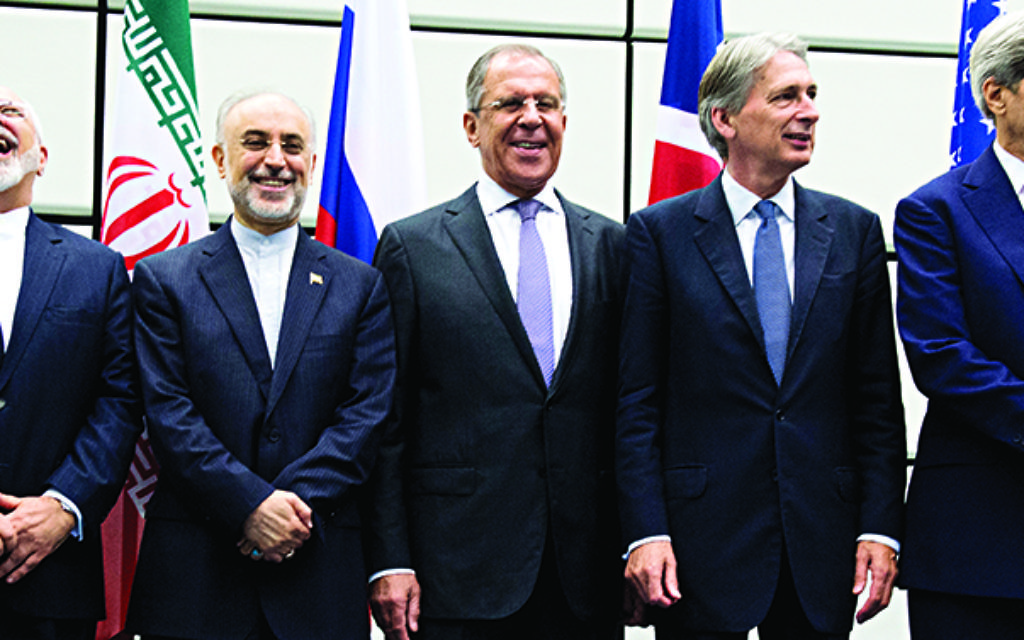Iran significantly reduced nuclear technology says UN report


Iran has started cutting back on some nuclear technology in line with a deal with six world powers, according to a UN nuclear agency report.
The UN’s International Atomic Energy Agency report, and an assessment by diplomats, present a mixed picture of the pace of Iran’s moves to comply with the July 14 deal it signed with the six countries and comes a month after the deal was formally adopted on October 18.
Since then, the report showed that Iran has significantly reduced the number of centrifuges meant to enrich uranium, which can produce nuclear fuel, isotopes for research, or the core of an atomic bomb, depending on the degree of enrichment.
Get The Jewish News Daily Edition by email and never miss our top stories Free Sign Up
It said 11,308 centrifuges were standing at Iran’s main enrichment centre as of November 15, about 3,000 fewer than previously. It also noted cuts at a smaller facility, for a total reduction of about 4,500 of the nearly 20,000 machines Iran had previously set up.
But the diplomats said all of the machines that have been taken out were previously idle. Thousands of centrifuges that were spinning uranium into enriched levels used for fuel are no longer online but remain on standby and can be restarted at short notice.
Under the terms of the July 14 deal, Iran is allowed to keep 5,060 centrifuges operating to enrich at levels significantly below weapons-grade and at concentrations normally used to generate energy. That is about half of the number it had running before adoption day.
One of the diplomats said that it is normal to start the cutbacks with the machines that have never been put to work, because the process of removing the ones that have been enriching is more complex.
But the other diplomat, from a Western country suspicious of Iran’s nuclear program, noted that the Iranians have publicly linked full implementation of the deal to another report meant to put to rest the issue of allegations that Tehran worked in the past on atomic arms.
Those Iranian officials have said Iran will not enact meaningful cuts in its enrichment program or other activities that could be used to make nuclear arms – as the July 14 deal foresees – until that second report is published next month.
The Islamic Republic denies any work or interest in such weapons and describes the allegations as based on falsified intelligence from Israel, the US and other nations that accuse it of trying to develop nuclear arms.
After fending off IAEA attempts to investigate the suspicions for more than a decade, Tehran agreed to cooperate with the agency under the condition that it delivers a final report that would put the issue to rest.
Iran was promised sanctions relief under the July 14 deal. Beyond cutting back on uranium enrichment in return, it must also re-engineer a reactor to reduce its output of plutonium, another pathway to an atomic bomb.
Implementation day for both sides to show they have abided by their commitments is expected to be early next year.

Thank you for helping to make Jewish News the leading source of news and opinion for the UK Jewish community. Today we're asking for your invaluable help to continue putting our community first in everything we do.
For as little as £5 a month you can help sustain the vital work we do in celebrating and standing up for Jewish life in Britain.
Jewish News holds our community together and keeps us connected. Like a synagogue, it’s where people turn to feel part of something bigger. It also proudly shows the rest of Britain the vibrancy and rich culture of modern Jewish life.
You can make a quick and easy one-off or monthly contribution of £5, £10, £20 or any other sum you’re comfortable with.
100% of your donation will help us continue celebrating our community, in all its dynamic diversity...
Engaging
Being a community platform means so much more than producing a newspaper and website. One of our proudest roles is media partnering with our invaluable charities to amplify the outstanding work they do to help us all.
Celebrating
There’s no shortage of oys in the world but Jewish News takes every opportunity to celebrate the joys too, through projects like Night of Heroes, 40 Under 40 and other compelling countdowns that make the community kvell with pride.
Pioneering
In the first collaboration between media outlets from different faiths, Jewish News worked with British Muslim TV and Church Times to produce a list of young activists leading the way on interfaith understanding.
Campaigning
Royal Mail issued a stamp honouring Holocaust hero Sir Nicholas Winton after a Jewish News campaign attracted more than 100,000 backers. Jewish Newsalso produces special editions of the paper highlighting pressing issues including mental health and Holocaust remembrance.
Easy access
In an age when news is readily accessible, Jewish News provides high-quality content free online and offline, removing any financial barriers to connecting people.
Voice of our community to wider society
The Jewish News team regularly appears on TV, radio and on the pages of the national press to comment on stories about the Jewish community. Easy access to the paper on the streets of London also means Jewish News provides an invaluable window into the community for the country at large.
We hope you agree all this is worth preserving.
-
By Laurent Vaughan - Senior Associate (Bishop & Sewell Solicitors)
-
By Laurent Vaughan - Senior Associate (Bishop & Sewell Solicitors)
-
By Laurent Vaughan - Senior Associate (Bishop & Sewell Solicitors)
-
By Laurent Vaughan - Senior Associate (Bishop & Sewell Solicitors)





















